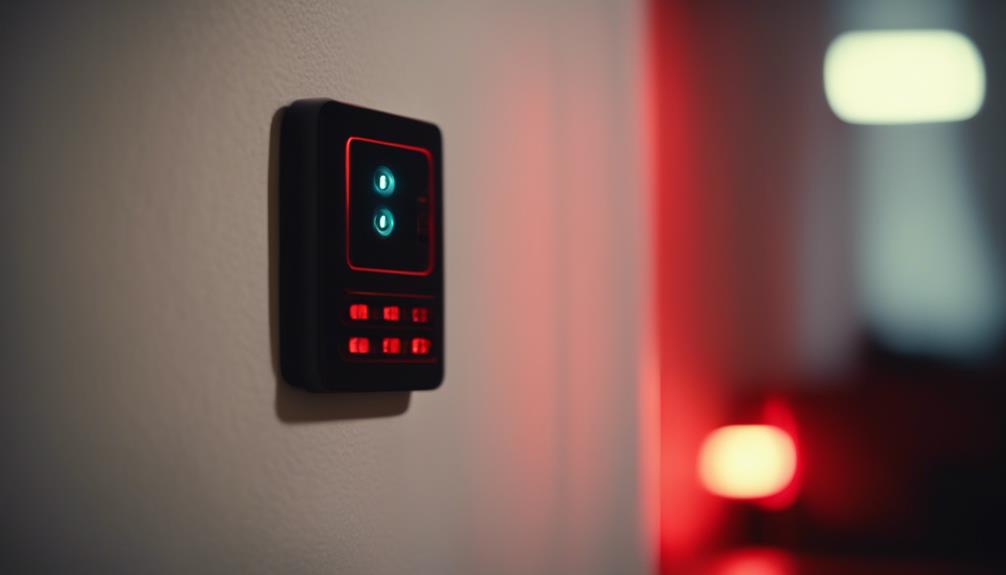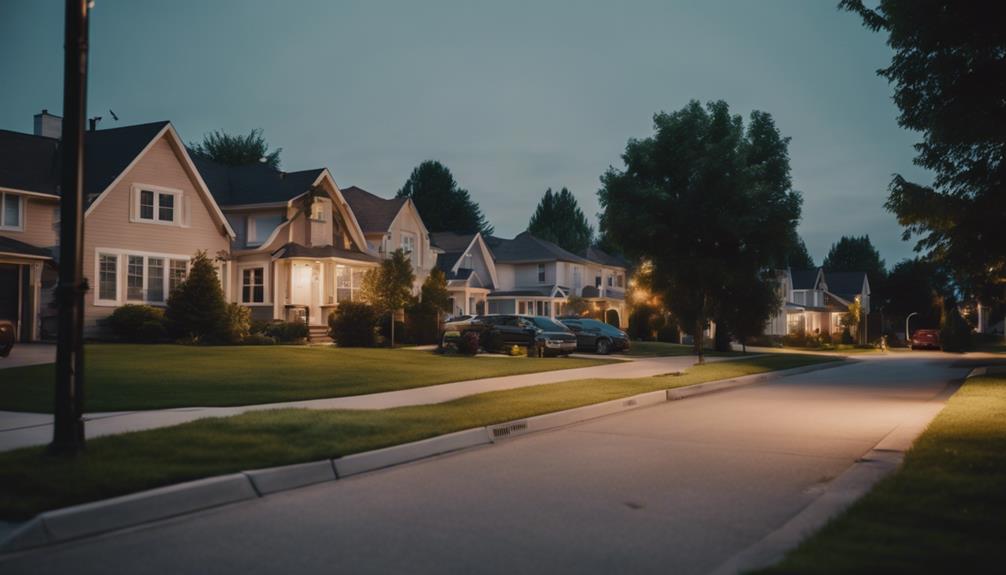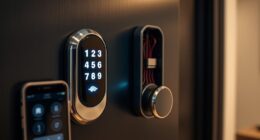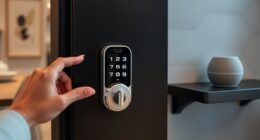Home security systems do not need an internet connection to operate effectively. You have the option to choose between wired or cellular cameras, which function independently of Wi-Fi. Wired cameras store recordings locally using DVRs or NVRs, while cellular systems operate on 4G or 5G networks, providing real-time monitoring without relying on the internet. This configuration not only improves privacy but also eliminates concerns about hacking. If you are seeking a solution to keep your home secure during outages, there are numerous options available to meet your needs. Let’s assess what aligns best with your security requirements.
Key Takeaways
- Home security systems can function without internet by utilizing local storage and cellular signals for video recording and monitoring.
- Wired security cameras do not require internet, as they store footage locally using DVRs or NVRs.
- Wireless security cameras can operate offline, storing data on microSD cards or connected DVR systems.
- Cellular security cameras use 4G/LTE or 5G networks, allowing remote monitoring without Wi-Fi access.
Home Security Without Internet
You can effectively secure your home without relying on the internet by using systems that utilize local storage and cellular signals. Many security cameras are designed to work without the internet, allowing you to monitor your property without Wi-Fi dependency.
For instance, cameras like the Arlo Go and Reolink Go use cellular networks, transmitting video footage through LTE or 5G. Additionally, some modern security systems incorporate features that enhance home security with advanced technology, similar to garage door openers which offer smart features for improved safety.
With systems that employ local storage options, such as DVRs or microSD cards, you can continuously record video directly on-site. This approach not only enhances your home's security but also minimizes the risk of hacking, as there's no internet connection to exploit.
Wired security camera systems, like CCTV, provide another reliable solution, transmitting video directly to a recording device via coaxial or Ethernet cables.
However, it's crucial to recognize that non-internet cameras typically lack remote access and real-time alerts. While this means you won't receive notifications on your smartphone, you can still access recorded footage by physically retrieving it, ensuring your home remains secure without the need for online connectivity.
Types of Security Cameras

When choosing a security camera, you'll encounter several options: wired, wireless, and cellular. Each type has its own benefits and drawbacks, depending on your installation preferences and security needs.
Understanding these differences will help you make the best choice for your home. For example, just like how air purifiers improve indoor air quality, certain security cameras can enhance your home's safety and comfort by providing peace of mind.
Be sure to evaluate factors such as placement and connectivity when making your decision.
Wired Security Cameras
How do wired security cameras enhance surveillance effectiveness while minimizing vulnerabilities?
Wired security cameras, including CCTV systems, deliver reliable, continuous recording without requiring internet connectivity. This makes them perfect for permanent installations where consistent surveillance is essential. They transmit video footage through coaxial or Ethernet cables to a central recording device, ensuring high-quality output.
Additionally, the distinction between cybersecurity measures and physical security solutions highlights the importance of thorough protection strategies in today's digital age, as seen in the nuances of offensive security careers.
One significant advantage of wired security cameras is their reduced vulnerability to hacking compared to wireless options. This added security is essential for effective surveillance setups. Many wired systems integrate seamlessly with digital video recorders (DVRs) or network video recorders (NVRs), providing secure local storage for your footage. This allows for indefinite data retention, ensuring you have access to important evidence whenever needed.
However, keep in mind that installation often requires professional assistance. Proper management of cabling and ideal camera placement are crucial for achieving the best results.
Wireless Security Cameras
Wireless security cameras offer a flexible alternative to wired systems, enabling convenient placement and installation while still providing effective surveillance. These systems can be particularly beneficial for those practicing RV living for preppers, as they allow monitoring of remote areas without the need for a constant internet connection.
You can enjoy the benefits of these cameras without relying on an internet connection. Many models, like Arlo Go and Reolink Go, utilize cellular networks, allowing for remote access and video recording without Wi-Fi.
Here are some important features of wireless security cameras:
- Local storage: Store footage on microSD cards or DVR systems for easy access.
- Offline monitoring: Operate without internet, reducing vulnerability to hacking.
- Data privacy: Enhanced security for users prioritizing offline solutions.
- CCTV compatibility: Some models support closed systems for reliable surveillance.
Cellular Security Cameras
Cellular security cameras provide a reliable surveillance solution by using 4G/LTE or 5G networks, making them ideal for locations without Wi-Fi access.
Cameras like the Arlo Go and Reolink Go operate independently of your home internet, guaranteeing you can monitor your property wherever you are.
For those considering security investments, it's important to evaluate risk management tactics to guarantee your surveillance system is effective.
To access features like remote viewing and cloud storage, you'll need a data plan, which is an important consideration in your budget.
These cameras are less vulnerable to hacking since they don't rely on Wi-Fi, giving you peace of mind.
You'll enjoy the convenience of mobile alerts and live streaming, though keep in mind that data usage limits might affect your streaming capabilities.
If you're in an area with poor internet service or need temporary surveillance, cellular security cameras offer reliable recording and monitoring without the need for a Wi-Fi connection.
While they come with a higher price point—around $200 each—they provide a solid solution for those serious about security.
Benefits of Cellular Connectivity

One major advantage of cellular connectivity is that it guarantees your security system stays operational, even during internet outages or disruptions. This reliability is vital for maintaining peace of mind regarding your home's safety.
With cellular security systems, you can enjoy numerous benefits, including the ability to verify that your system is always connected, much like how certain zodiac signs are perceived as more appealing socially due to their inherent traits that foster strong relationships astrological compatibility.
- Continuous Operation: Your system functions without needing Wi-Fi, guaranteeing constant communication.
- Remote Access: You can monitor video footage and receive real-time notifications through mobile apps from anywhere.
- Secure Connections: Cellular connectivity is less vulnerable to hacking, providing enhanced protection for your sensitive data.
- Flexibility: Ideal for remote areas, these systems can be installed even when Wi-Fi isn't available.
Comparing Wi-Fi and No-Wi-Fi

When choosing a home security system, understanding the differences between Wi-Fi and no-Wi-Fi options can greatly impact your decision.
Wi-Fi security cameras typically provide features like remote access, real-time alerts, and live streaming, making them appealing for tech-savvy users. Furthermore, integrating features that enhance user experience can greatly improve your overall security setup, as seen in celebrating special occasions. However, they often rely on cloud storage, which can lead to ongoing costs and potential data privacy concerns due to hacking vulnerabilities.
On the other hand, no-Wi-Fi systems focus on local recording, offering enhanced privacy and security. These include wired cameras and analog systems that use DVR systems or microSD cards for continuous footage storage, eliminating the risk of data loss from internet outages. While cellular signal cameras offer an alternative by utilizing LTE/5G networks, they can incur additional data plan costs and may have limited streaming capabilities.
Ultimately, your choice between Wi-Fi and no-Wi-Fi home security systems should depend on your specific security needs, installation preferences, and considerations regarding ongoing costs and data privacy. By evaluating these factors, you can select a system that best fits your lifestyle and security requirements.
Local Storage Solutions

When considering local storage solutions for your home security system, you've got options like DVRs and microSD cards.
These methods not only keep your footage accessible without needing the internet, but they also offer significant privacy benefits.
Let's explore the different types of local storage and the perks of recording right at home.
Types of Local Storage
Local storage solutions for home security systems, such as microSD cards, DVRs, and NVRs, let you record and store footage onsite without relying on internet connectivity. These systems enhance data privacy by keeping your footage recorded locally, minimizing the risk of hacking.
Here are some common types of local storage:
- MicroSD Cards: Compact and easily installed in many security cameras, providing a straightforward storage option.
- DVR (Digital Video Recorder): Typically offers 1 TB of storage for up to 16 cameras, allowing for continuous recording without internet dependency.
- NVR (Network Video Recorder): Works with IP cameras, offering advanced features and expandable storage options.
- CCTV Systems: Utilize wired security systems that transmit video via coaxial cables, ensuring reliable performance without interruptions.
These local storage solutions are ideal for anyone looking to maintain control over their security footage while ensuring reliable performance without the need for an internet connection.
Benefits of Local Recording
Storing footage locally offers you greater control over your security data, ensuring it remains accessible even without internet access. With local storage solutions, your security cameras can record video directly onto devices like DVRs or microSD cards, so you won't lose any critical footage during internet outages. For instance, systems like Lorex provide DVRs with expandable storage options, starting at 1 TB, capable of holding around 20 days of 1080p video from a single camera.
One of the most significant benefits of local recording is enhanced privacy and security. Since your footage isn't transmitted over the internet, you reduce the risk of hacking or data breaches.
Plus, if you experience power outages, local recording cameras equipped with battery backup can continue to operate, maintaining uninterrupted surveillance.
You can easily access recorded footage by physically retrieving the storage device, which minimizes the risk of losing data due to online service interruptions or cloud storage failures.
Installation Considerations

Installing a home security system involves several key considerations that can impact both functionality and ease of setup.
You'll need to decide between wired systems and wireless cameras, as each has its pros and cons. Wired systems often require professional installation, especially when connecting to a DVR or NVR, while wireless cameras typically allow for a quicker setup process with minimal tools.
Here are some important factors to keep in mind:
- Wired vs. Wireless: Choose based on your installation comfort level and home layout.
- Battery-Powered Cameras: These offer flexibility in placement, especially in areas without electrical outlets.
- Power-over-Ethernet (PoE): This simplifies installation by using one cable for power and data, reducing clutter.
- Number of Cameras: More cameras can complicate the setup process; plan accordingly.
Cost Implications

Understanding the cost implications of home security systems is essential, as your choices can greatly impact both initial investments and ongoing expenses.
If you opt for Wi-Fi systems, be prepared for monthly subscription fees for cloud storage, which can range from $5 to $30. On the other hand, cameras without the internet, like cellular systems, typically require a data plan costing between $10 and $50 per month, depending on usage.
Initial installation costs can also vary considerably. For wired security cameras, you might see higher expenses starting at around $100 due to professional installation and cabling. Additionally, non-Wi-Fi options with local storage, such as DVR systems, may have lower ongoing costs since they eliminate cloud storage fees. However, initial equipment costs can be higher, sometimes reaching $200 or more for a thorough setup.
Ultimately, the total cost of ownership for your home security system can fluctuate based on your choice of internet connectivity. While Wi-Fi systems provide convenience, they might lead to higher long-term expenses compared to other options.
Security Features Overview

Home security systems offer a variety of features, with internet connectivity enhancing capabilities like remote access, live streaming, and real-time alerts. While many systems rely on the internet for advanced monitoring, there are options that work without it.
Here are some key security features to evaluate:
- Wireless security cameras: These can operate without internet but may lack certain remote features.
- Local storage: Footage will be stored on DVRs or microSD cards, giving you access without needing the cloud.
- Cloud video: For those who prefer off-site storage, cloud options provide remote access to footage.
- Cellular signals: Cameras like Arlo Go offer mobile connectivity, allowing monitoring through cellular networks.
Understanding these features helps you choose the right system based on your needs.
Whether you want advanced monitoring or prefer a simpler setup, knowing how security cameras work without internet can guide your decision-making.
Frequently Asked Questions
Can You Have a Security System Without Internet?
Yes, you can absolutely have a security system without internet. You can use wired cameras or cellular signal systems, ensuring reliable surveillance and local storage without relying on Wi-Fi for operation or monitoring.
How to Have Security Cameras Without Wifi?
You can have security cameras without Wi-Fi by choosing models that use local storage like microSD cards or connecting through cellular networks. Wired systems, like CCTV, also transmit footage directly without needing an internet connection.
What Is Required for a Home Security System?
Imagine a fortress guarding your peace of mind. For a home security system, you'll need cameras, a central hub, storage options, and possibly sensors. Together, they'll create a protective shield around your sanctuary.
Do Wired Security Cameras Need Internet?
Wired security cameras don't need internet to function. They connect directly to a DVR or NVR for storage and monitoring, ensuring reliable video transmission without Wi-Fi, making them a secure option for your home.
What Are the Benefits of Having a Home Security System Without Internet?
Having a home security system without internet brings peace of mind. It provides reliable protection without relying on Wi-Fi, ensuring constant monitoring. With this system, you can safeguard your home against burglaries and emergencies, keeping your family and possessions safe. Upgrade to a home security without internet for added security.
Conclusion
To sum up, while many home security systems thrive on internet connectivity, you can still find robust options that operate independently.
Think of it as a sturdy fortress—just because it lacks a digital drawbridge doesn't mean it's defenseless.
By weighing your choices between cellular, local storage, and traditional setups, you can tailor a solution that fits your needs and budget.
Ultimately, peace of mind is what you're after, and there are plenty of ways to achieve it without being online.









